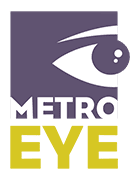Seeing is believing.
However, common patient misconceptions can prevent them from taking the plunge into progressive lenses, also known as “no-line bifocals.” As Milwaukee’s leading optometrists, we often hear a patient say their friends told them progressive lenses are difficult to get used to, so they avoid taking the plunge.
This does not have to be the case if they are fit properly. The four EQUALLY important things to a proper progressive lens fit are:
- A good prescription, which is the doctor’s responsibility. Metro Eye Dr. Amy Jankowski is Milwaukee’s hard-to-fit specialists with decades of experience correctly diagnosing and helping their patients in the Milwaukee Metro.
- A properly fitting frame, which is the optician’s responsibility. You’ve heard the saying that everyone is as unique as a snowflake. Well, that’s cute … and true. Every patient has different features, visual needs and therefore it’s important to have a well-trained optical stylist to fit you for eyewear.
- Choosing the best type of progressive lenses. Believe it or not there are many different designs and materials to choose from when it comes to your lenses. Choosing the right lens should be based on your lifestyle and your visual needs. Not all lenses are created equal, especially when it comes to progressives. Metro Eye’s optical stylists are here to help you select the best lens for you.
- Lens placement in frame. This is the lab’s responsibility. We can’t stress enough the importance of using a high-quality lab. Metro Eye can proudly say that we have a lab that we can trust to stand behind their lenses.
When you opt for “2 for $99” shops, you may be compromising your vision. Getting your glasses in an hour, or sent in the mail may seem quick and easy, but the clearest most comfortable vision comes with a dedicated team of professionals.

